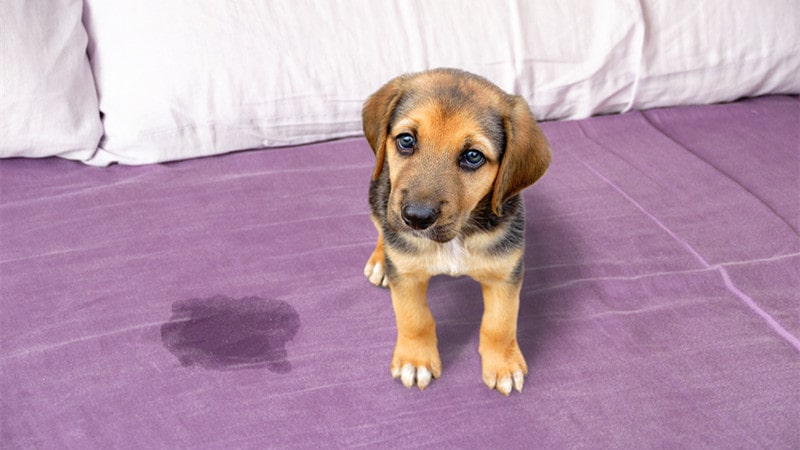A puddle in the wrong place is an unpleasant occurrence. Owners of not only puppies but also adult pets encounter the issue of eliminating wherever they please. Many of them don’t understand how to stop a dog from peeing on the owner’s bed, as they use only one method – behavior correction. In fact, the solution depends on the reason behind the problem. Sometimes, the only effective solution is to seek veterinary care.
Why the dog started peeing on the bed: reasons for the behavior
The causes of undesirable behavior are divided into physiological and pathological. The former are not dangerous to health and are easily corrected. The latter can lead to serious disorders. They are treated with medication or surgery.
Instincts.
The issue with urination can be explained by both innate and acquired instincts. This group includes harmless reasons such as:
• Young age. Puppies have not yet learned to control their bladder. They eliminate wherever they happen to be.
• Marking territory. The tendency to leave marks develops after reaching sexual maturity. Note that not only males but also some females engage in this behavior.
• A reflex acquired from the mother. Regular stimulation of the belly before going to the toilet becomes ingrained at the instinctual level. If a puppy got used to urinating every time its mother licked it, do not be surprised if a similar result occurs from simply scratching its belly.
• Adverse weather conditions. Relieving oneself in harsh cold is very unpleasant. The most resourceful pets start doing it at home, i.e., under more comfortable conditions.
• Lack of training. If an adult animal is not toilet trained, then the same methods used for training a puppy are applied.
• Disrupted routine. A pet may have accidents due to overly long breaks between walks.
• Revenge. Another possible reason for leaving puddles is strong resentment. A dog may seek revenge for harsh treatment or lack of attention.
• Habit. Bed linen and the soft upholstery of a couch may be mistaken for a diaper. In this case, the animal simply tries to follow established rules and does not understand its mistake.
All the listed reasons should not affect well-being. Loss of activity, apathy, and other alarming symptoms are characteristic of diseases and nervous disorders.
Disease.
When an animal urinates in inappropriate places due to a pathology, it does so not out of choice but because of pain or incontinence. In the first case, it tries to find a corner where it feels more comfortable, and in the second, it simply cannot make it to the litter box or wait to go outside.
The following disorders are characteristic of these diseases:
• Urinary tract infections (UTIs) and cystitis;
• Gastrointestinal diseases;
• Kidney pathologies;
• Internal organ injuries;
• Weakness of the bladder sphincter in old age.
The exact cause of incontinence can only be determined through diagnostics. For this, one must seek help from a veterinary clinic.
Nervous Disorders.
Besides the usual lack of attention, there are more serious reasons, including:
• Stress caused by moving, visiting the vet, or the arrival of a new family member;
• Fears and phobias;
• Unstable psyche.
The last case is very rarely correctable, as the cause of fearfulness is innate, not acquired. In all other cases, it is enough to eliminate the provoking factor and undergo a course of sedative medications.
What to Do if Your Dog Pees on the Bed
Having figured out why the dog pees on the bed, confidently proceed to discourage it. One of the three methods listed below will be suitable.
Behavior Correction
If the problem lies in too harsh treatment – reconsider your own behavior and try to use softer methods of influence. Pay more attention to your pet and don’t forget about the basics of training:
• Allocate a place for the litter box. If the dog is accustomed to going to the toilet indoors but has recently moved – take the litter box with you. A familiar smell will guide the four-legged to the right place.
• Use prohibition commands. Stop undesirable behavior with a strict “No” or “Don’t”.
• Restrict access to the bed and sofas. The dog must understand that these items are available only to the owners. Jumping on them is allowed only after receiving the corresponding command.
When correcting behavior, don’t forget about the combination of punishments and rewards. All family members should participate in training the pet, as even a single indulgence can negate all efforts.
Solving Physiological and Health Problems
Active marking can be waited out, but in this case, the animal will still mark its territory in the future. The only reliable method is castration or sterilization.
If the problem lies in pathology, then definitely show your pet to a veterinarian. In this case, you won’t have to puzzle over how to stop the dog from messing on the couch. After recovery, it will again relieve itself in the appropriate place.
In addition to medication and surgery, the help of a veterinary behaviorist may be required. This specialist helps to cope with severe stress and phobias.
Changes in the Daily Routine
Changes will also need to be made to the daily routine. This will require:
• Increasing the amount of liquid consumed. The more the pet drinks before a walk, the more likely it is that it will urinate outdoors.
• Making walks more frequent and longer. Go out for a walk every time the dog asks for it, and don’t return home until it has finished its business. If you lack free time, it’s recommended to entrust the walking to a dog walker.
• Adding more activity. Active games and running stimulate the bladder, prompting the need to urinate. If your pet doesn’t like playing alone – find it a four-legged companion right on the street. A new friend can help not only with their company but also by setting an example. Imitation works especially well on puppies.
• Isolating access to the room for a few days or closely monitoring to ensure the dog doesn’t stay in it alone. If it continues to rush to the site of its crime, there’s a high likelihood of resentment. In this case, the four-legged friend simply needs more attention, supplementing daily walks with joint games and interesting trips to nature.
If health problems and poor training are ruled out, then the listed recommendations will quickly yield the desired result.
Is Punishment Necessary?
When it comes to urination in inappropriate places, it’s essential to show firmness. It’s important not to forget about the limits of what is allowed and to maintain a balance. Punishments for undesirable actions must be accompanied by generous rewards for successes.
What Punishment Methods Can Be Used
Punishment methods must be exclusively humane. The most effective include the following:
• Demonstrating dominance. Take the pet by the scruff and press its muzzle to the floor for a couple of seconds, saying “No” or “Bad” in a firm voice. When performing this action, do not lift the dog off the ground, do not shove its face directly into the puddle, and do not resort to yelling.
• Distraction at the moment of the crime. If you catch the animal in the act, clap your hands sharply or throw a light object at it that will definitely not cause pain. The act of urination is very intimate, so such an invasion of privacy creates aversion to the chosen spot.
• Taking away a favorite toy. After losing its beloved ball several times in a row, the pet will think twice before peeing in an inappropriate place again. Unlike food, a toy is not a necessity, so such punishment is quite harmless.
Note that punishments should follow every detected misdemeanor. Otherwise, the dog will associate them not with its wrongdoing but with unjustified cruelty – as it won’t understand what it is being punished for.
Forbidden Measures
Forbidden measures include anything that can affect the physical and mental health of the animal. Yelling, beating, depriving of food, play, and walks are not allowed. Cruel treatment will not only fail to yield the desired result but will also exacerbate the situation.
When Should You Not Scold the Pet
Scolding is pointless if the animal is not caught red-handed. Delayed punishment does not have the desired effect, as the offender simply does not understand what it is being reprimanded for.
Also, do not scold the poor thing if it is obviously ill. Simply leave the situation unattended, focusing on treating the pathology.
Rewards Sometimes Work Better
Despite the effectiveness of punishments, positive motivation always works better than negative. For this reason, don’t forget to praise your pet after it relieves itself outdoors. In addition to affection and kind words, treats work well.
You can solidify the desired skill with a specific sequence: command – action – reward. As soon as the dog begins to squat – tell it “pee” or any other code word. Upon success, give a tasty treat as a reward and be sure to express your admiration.
How to Proceed with a Puppy
If a well-behaved dog pees on the bed in adulthood, the problem often lies in pathology. With puppies, it’s different. Due to their age, they are just learning to control their urges, so you need to be patient and start training.
To toilet train, you will need to:
• Isolate access to rooms with sofas and beds, and remove all rugs from the floor.
• Learn prohibition commands and the “Place” command.
• Choose a separate corner for pee pads or a litter box.
• Go for walks before each feeding, immediately after waking up, and shortly before bedtime.
• Maintain a schedule so the puppy learns to hold it for certain intervals without accidents.
You can remove the pee pads once the little one starts relieving itself on every walk. Left without alternatives, it will quickly understand that the only correct place is outside the home.
Special Products from Veterinary Pharmacies
Some owners use home remedies for deterrence: essential oils of citrus and eucalyptus, cinnamon, mint, citric acid, and vinegar. Despite their effectiveness, they can damage the color of the bed or bedding. There’s also the risk of dulling the animal’s sense of smell. This can happen when the substance is too concentrated.
It’s easiest to use special products from veterinary pharmacies. Unlike home remedies, they are completely safe for dogs and humans, but no less effective. Their smell is unpleasant to four-legged friends, so interest in the sprayed bed or sofa quickly disappears.
Conclusion
If your pet is usually well-behaved, do not ignore the sudden appearance of puddles in the house. Accompanying symptoms and a veterinary examination will help determine why the dog is peeing on the bed. Until then, keep your cool and avoid any punishment.




